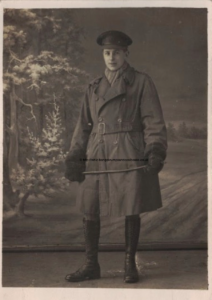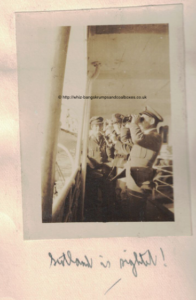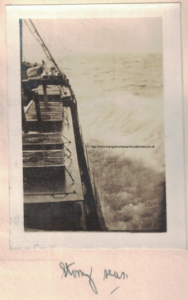14th September 2019 Saturday
Postscript
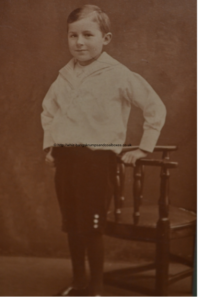
Douglas Page aged about 9
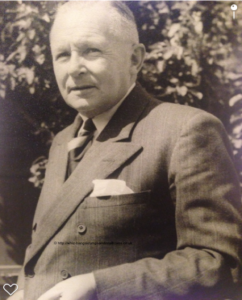
“Di” in retirement
The diary that Douglas left us wasn’t merely a tale of war. Rather it was the story of a young newly qualified medic that through the accident of time was catapulted into the fastest and most thorough field training that God could have ever devised for a man. We learned that amongst the horror of war there was fine dining, dancing, laughter, weekends off and sightseeing. Douglas describes “wonderful” scenes of spectacular events. We learned about his laidback character that seemed to take the war in his stride. Though never firing a shot in four years of conflict, he laid his life open to the most extreme danger to help his comrades and country. He escaped death by a whisker on several occasions: almost blown to pieces by a shell at Richebourg in 1915; saw most of his unit wiped out at the Somme in 1916; survived the horror of Alouette Farm bunker in 1917; gassed while rescuing others in 1918 before finally surviving the Bolsheviks in 1919, he was miraculously spared to continue a lifetime of helping and tending to the sick of the communities he served.
For reasons that seem only to be that the war was the war and everything else was different, he never mentioned any hint of romance in his life. Never once did he talk of writing to a sweetheart. He never wrote of his hopes for the future. So, it must come as something of a surprise to the reader that so quickly after coming home for good he married the young girl he was to spend the rest of his life with. He mentions her only once in the diary when Elma accompanied her mother on the motor car trip whilst home on leave early in 1916. She was a young teenage girl then only 15 years old.
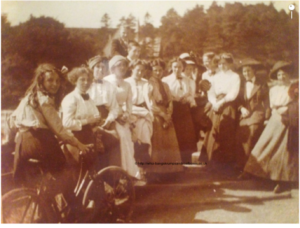
Elma circa 1915 on the bicycle
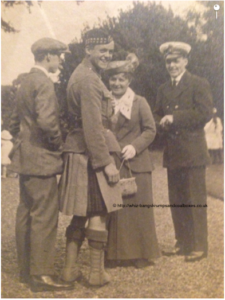
Left to Right Kenneth Croal K.I.A 1918 in Oborzerskaya, Russia. Then Elma’s family T.G.Gordon Sturrock K.I.A France 1916. Mrs Annie Sturrock, Elma’s mother and Douglas Sturrock RNVR her brother that was on the quayside at Leith.
Kenneth Croal was mentioned in the diary as having met Douglas for the first time on the City of Cairo on the way out to Archangel. He is also mentioned by General Ironside in his book “Archangel 1918-1919” (ISBN 847347-32-0)
On 1st November 1919, Captain Douglas Charles Murray Page RAMC MC married Elizabeth Mary (Elma) Sturrock at St. Cuthbert’s Parish Church in Edinburgh. Captain Page became Dr. Douglas Page MC and the young couple moved at first to Keswick in Cumbria where he acted as an assistant and then to Stowe in the Border lands of Scotland where he began his own general practice. Unfortunately, he felt that in Stowe they were too remote, cut off from the rest of the family. When Elma fell pregnant with daughter Ann, Douglas sent her to Edinburgh to be near her mother and her family. Ann was born in Edinburgh in November 1920. Son Gordon coming along in November 1923.
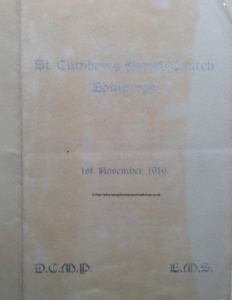
Cover of the wedding service
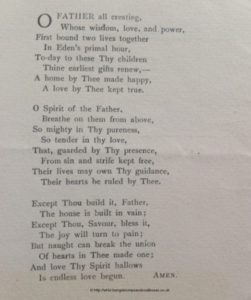
The music content for the wedding service
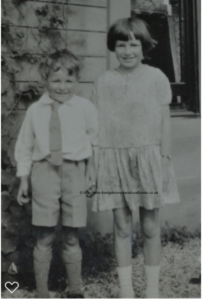
Di and Elma’s children Gordon and Ann
By about 1928 the family moved to the coastal town of Pittenweem in Fife where Douglas worked as a G.P. until his retirement in 1958.
1931 saw the first of a series of re-union dinners for the surviving members of the 130th (St John) Field Ambulance. On the 28th September 1935 it was reported in the Western Mail that it was the fifth such event that had taken place. Douglas was invited to attend along with Captain F.A. Anderson and just as in France, Colonel J.E.H. Davies D.S.O. controlled proceedings. It was held in Cardiff and organised by Bugler W.G. Thomas and Captain L.C. Cohen. The event was repeated in 1936 and probably continued for some time after.
Having done more than his fair share of defending his country Douglas wasn’t so involved in the Second World War, although didn’t escape it entirely. The Fife coast including the villages of Anstruther, Elie, Pittenweem and Crail were subjected to at least three terrifying opportunistic air raids by the Luftwaffe during 1940 and 1941.
By the time of his retirement he had become a respected and much-loved member of the community as well as a family man. He had helped establish the Pittenweem branch of the British Legion and was instrumental in setting up first aid training through them and of course presided over the concerts organised by them too. After becoming a vice-president he was unanimously voted President in 1957 only to announce his retirement in December of that year. Shocked at the pending loss of their beloved GP, a committee was formed and went into action to organise an official goodbye ceremony which was held in the large drawing room at Dr. and Mrs Page’s Murrayfield home and surgery. It was attended by the great and good of the area, much of the nursing staff and included the Earl and Countess of Crawford, a resident of Colinsburgh. Speeches were made and then a presentation of an inscribed clock and a cheque for the balance of the money raised. Douglas’s famed sense of humour wasn’t lost on the occasion when he let it be known that his new bungalow was situated quite close to the Glen o’Dee Sanitorium.
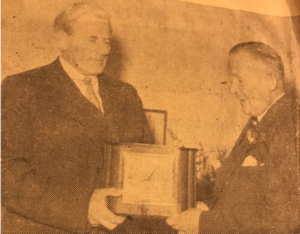
The 28th Earl of Crawford presents the clock
After retirement, Dr. and Mrs. Page bought a bungalow, which they also named Murrayfield in Banchory, Royal Deeside, Aberdeenshire to be near daughter Ann, who had married former Scotland ice hockey star Ronnie MacDonald and together had bought the Banchory Lodge hotel in Banchory.
Dr. Page continued to act as a locum to the local surgery in Banchory, filling in for sickness and holidays. He was also a keen bird watcher and as late as 1964 had posted an observation of waxwings in the journal of the Scottish Ornithologists Club “Scottish Birds”.
Ann and Ronnie produced four grandchildren for Douglas and Elma. Those grandchildren Douglas, Ruth, Gavin and Elizabeth always knew Douglas Page as Di, a Scottish term for grandad. Ann’s brother Gordon married Ruth Westcott and moved to Calgary, Canada producing more grandchildren, Belinda, Brian and Matthew.
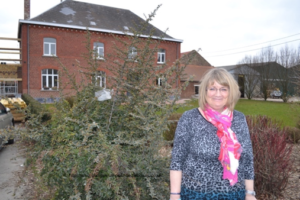
Ann’s daughter and Di’s Grandaughter Liz Coggin at Mesplaux Farm, France in 2016
It is thanks to Douglas’s son Gordon Page that we were able to have a copy of the diary. He sent the photocopy in two volumes from Canada to his niece Elizabeth in West Sussex, Di’s grandaughter, arriving through the post like two large telephone directories. The centenary of the events seemed a fitting time to add to the many memorial events taking place throughout the world to remember that dark and ultimately pointless conflict one hundred years ago.
Thanks must go to Dr. Brian Page and his wife Joanne in Calgary for supplying better copies of the diary photographs, a time consuming task. To Liz Coggin for her patience in letting me do this. To Dmitry Bychikhin for his information about Archangel. To all those people that have answered questions, asked questions and have participated in any way.
The biggest thank you must go to Joanna Moncrieff, my worthy assistant in producing this work, it has been a remarkable tale of learning. Joanna has dedicated four years of her life to the project with the utmost enthusiasm.
We have learned so much. The research has been an enjoyable process and Joanna has learned how to edit and produce the online content. Her expertise in legal matters has hopefully kept us within copyright laws. On many occasions she changed copy or advised me not to use things without permissions etc. Hopefully we managed that, if we made any mistakes we will always correct or remove them if need be.
—————-
Captain/Doctor Douglas C.M. Page RAMC MC GP finally departed this life on 14th June 1965 following a heart attack aged 71. R.I.P.
12th September 1919 Friday
A New Day. The Final Day.
All material produced or reproduced here and throughout this work is the sole copyright of the author and the family of Doctor D.C.M. Page MC
“When I went on deck next day I found that we were anchored off Newhaven, and we remained there till 3 p.m. much to my disgust. It was tantalising to be able to see the electric cars running through Leith, and yet not be able to go ashore. It was a miserable day – cold and very wet. The ‘Khalyan’ and ‘Czaritza’ left Leith Docks about 3 o’clock, and we were towed in. Waiting in the pouring rain on the dock-side were two solitary figures – one, my future brother-in-law, and the other – well, this is not a novel with a happy ending, so I will draw a veil over that bit.
Needless to say, I wangled matters very successfully with the Embarkation Officer, and was first off the ship, complete with kit, so that after all my Russian adventure ended very happily indeed!”
The ship must have weighed anchor during the night and made its way a bit closer to Leith before dropping anchor once more opposite Newhaven, waiting for a space to dock.
At last, after almost four years Douglas’s war had finally come to an end. It began with a stormy sea voyage on the Huanchaco back in December 1915 and ended with a stormy sea voyage on the Cap Verde in September 1919.
Thanks to the wonderful document he left behind we have all been able to follow his journey through the Great War. At a time when he might have been expected to have suffered enough and while fighting was continuing on the Western Front, he was whisked away once more to bizarrely take a role in the Russian Revolution.
So, what remained now for Captain Douglas Charles Murray Page RAMC MC? He wrote of the two people that were there to greet him on Leith dockside, one being his future brother-in-law. I can tell you that he was Lt. Douglas Sturrock RNVR the brother of poor Gordon Sturrock, sadly killed at Linselles in October 1916. The other person remains a mystery. At no time during the diary does he mention any hint of a romance. Could it be that the mystery person was young Elizabeth Mary Sturrock, Douglas and Gordon Sturrock’s young sister? There’s no way of telling. Why did he say “this is not a novel with a happy ending”? Presumably because it isn’t a novel, it’s a war diary. The remark sounds sinister at first until the reader may realise that he probably felt she had no place in a war diary. So, we may have formed an impression that Douglas Page liked things to be “right”? Another tale to be told perhaps.
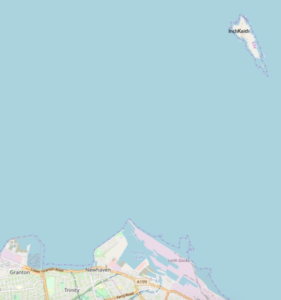
The Approaches to Leith Harbour and Dock © OpenStreetMap contributors
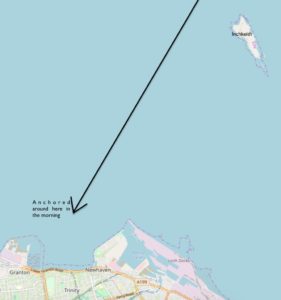
There will be some postscripts to add so please watch for further posts in the not too distant future. We shall continue to update and post new information as we get it and editing will continue for as long as we can.
The End
(Almost)
Find out about our connection with Dr Page and an introduction to his diary here
11th September 1919 Thursday
Tantalisingly Close
All material produced or reproduced here and throughout this work is the sole copyright of the author and the family of Doctor D.C.M. Page MC
“On Thursday, Sept. 11, we passed down the Scottish coast all day, and were able to recognise such places as Fraserburgh, Peterhead, Aberdeen, Stonehaven and the Bell Rock Lighthouse. We passed the May Island about 6 p.m., but it was dark while we passed by the Fife coast. I was able to make out the different villages, and saw Elie light flashing. We dropped anchor about 7 p.m. on the North side of Inchkeith. The lights of ‘Auld Reekie’ thrilled me. We held another rowdy concert at night.”
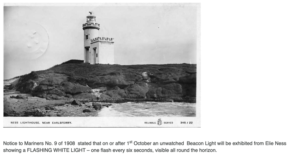
The Elie Light (http://www.eliehistory.com)
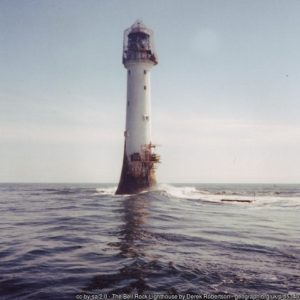
The Bell Rock Lighthouse
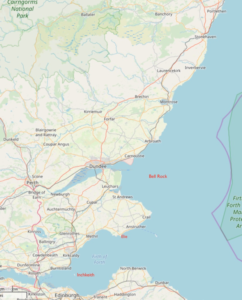
The east coast of Scotland showing the places mentioned © OpenStreetMap contributors
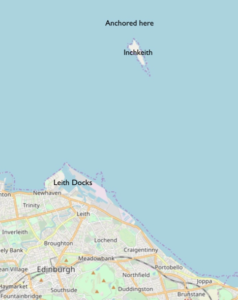
“He had a voice like the Inchkeith Foghorn on a particularly foggy night”.
http://whiz-bangskrumpsandcoalboxes.co.uk/2015/12/25/25th-december-1915-saturday/ © OpenStreetMap contributors
Find out about our connection with Dr Page and an introduction to his diary here
10th September 1919 Wednesday
Scotland Ahoy
All material produced or reproduced here and throughout this work is the sole copyright of the author and the family of Doctor D.C.M. Page MC
“About 3 p.m. on the 10th we sighted the Shetland Islands, and a great cheer went up from a group of us on deck. The cheering attracted the attention of the weak ones down below, and soon we were joined by a lot of green and pale-faced ones. It was great to see land again. That night there was tremendous rejoicing on board. We had a rousing sing-song at which a Russian lady sang beautifully.”
Find out about our connection with Dr Page and an introduction to his diary here
6th September 1919 Saturday
The Four Day Storm
All material produced or reproduced here and throughout this work is the sole copyright of the author and the family of Doctor D.C.M. Page MC
“A great storm arose on the third day, and continued for four days. The boat pitched and tossed considerably, and I felt rather squeamish on the first night of the storm. However, I lay low in my hammock for a day, and got up next day ravenously hungry and feeling fine.”
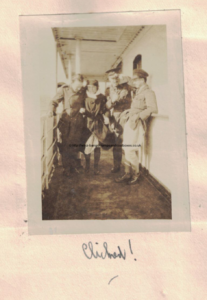
Clicked!
Find out about our connection with Dr Page and an introduction to his diary here
5th September 1919 Friday
A Drinking Orgy and a Loose Woman!
All material produced or reproduced here and throughout this work is the sole copyright of the author and the family of Doctor D.C.M. Page MC
“During the day we perambulated the decks, or played bridge in the comfortable smoke-room. We had a sing-song nearly every night. Two or three Russian Nursing Sisters were aboard also – one of them a thorough bad lot. The O.C. Troop – Colonel Dale – spoke to us at a meeting in the saloon about this woman, and caused the immediate surroundings of the cabins to be put out of bounds. Some of the wilder spirits amongst the officers had a disgusting drinking orgy on the first night out, and the Colonel threatened to put them in irons if it occurred again.
On the second day out we saw the coast of Norway. It looked very bleak, rugged and forbidding.”
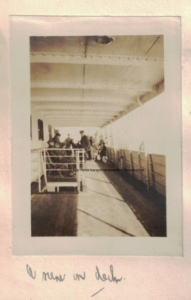
A scene on deck.
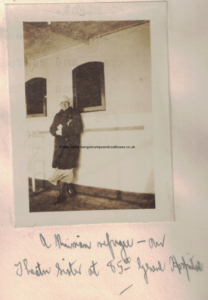
A Russian refugee-Our Theatre Sister at 85th General Hospital. (Hopefully not the “thorough bad lot”!)
Find out about our connection with Dr Page and an introduction to his diary here
4th September 1919 Thursday
The Wait is Over
All material produced or reproduced here and throughout this work is the sole copyright of the author and the family of Doctor D.C.M. Page MC
“September 4th was a great day for me. I left for Blighty on the ‘Cap Verde’, a captured Hun liner. The excitement was intense. I didn’t sleep all night and was up about 5 o’clock getting all my kit packed up. A motor lorry took my kit along to the quay at Archangel, and I journeyed thither by electric car – my last tram ride in Bolshevik Russia. All was bustle on the quay-side. I got on board at 10 o’clock, and found that all British officers had to sleep in hammocks in one of the holds. There were a lot of Russian civilian refugees on board, who occupied all the cabin accommodation. The very excellent meals were served in a gorgeous saloon. I fairly revelled in the change of food, and especially enjoyed my breakfasts on board. We sailed at five o’clock p.m. and I heard a great sigh of relief as we pulled out into mid-stream. Of course, I knew most of the officers aboard. We were a very happy party.”
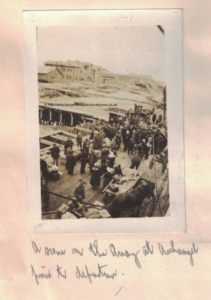
A scene on the Quay at Archangel prior to departure.
Almost ten months had passed since the Imperial German Navy fleet (Kaiserliche Marine) had been forced to surrender their ships into British custody, in a humiliating surrender on the 21st November 1918. It became the final action of WW1 ten days after the armistice. Many of the fleet of 74 ships were interred in the deep anchorage off the Orkneys, Scapa Flow. Then on June 21st 1919 following the orders of Admiral Ludvig von Reuter who was left in charge of the 5000 strong German Navy still aboard their ships, 52 great German fighting ships were scuttled by their crews and sent to the bottom. Nine unarmed German sailors were shot during the panic and became the last men killed of WW1. Much of the remaining merchant fleet was spilt between the allies and now Douglas was sailing home on one of Germany’s most luxurious passenger liners the SS Cap Verde.
The Cap Verde operated from her home port of Hamburg and travelled the whole globe. She operated a regular service to the South of Brazil via Dover and had been a visitor to South Africa, Australia and Vancouver. For now, she would make regular trips removing the British troops and thousands of Russian refugees from Archangel.
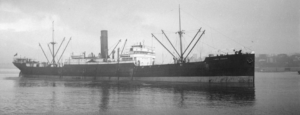
SS Cape Verde in Vancouver.
Find out about our connection with Dr Page and an introduction to his diary here
2nd September 1919 Tuesday
Fire Attack!
All material produced or reproduced here and throughout this work is the sole copyright of the author and the family of Doctor D.C.M. Page MC
“I saw a thrilling and awful sight on September 2nd. At a small village named Mimaxe about 4 miles down the river towards the White Sea, the Bolsheviks at a narrow part of the river had set fire to the huge piles of dry, stacked logs. There must have been hundreds of thousands of logs, and the heat from these blazing piles was terrific. The buildings were ablaze too, and all the great saw-mills for miles were gutted. It was a tremendous blaze. The roar of the flames could be heard a long distance off. Of course no boats could get up or down the river. The Bolos had purposely chosen this narrow part of the river in order to prevent British ships from leaving Archangel. I began to wonder if I would ever get home. At night the whole sky was lit up. British and Russian tugs were hastened to the scene of the fire, and had it under control in a remarkably short space of time. They played water on the blazing logs from the river.”
Find out about our connection with Dr Page and an introduction to his diary here
1st September 1919 Monday
Disappointment and Fending For Themselves
All material produced or reproduced here and throughout this work is the sole copyright of the author and the family of Doctor D.C.M. Page MC
“On September 1st sixty-nine of our men left for ‘Blighty’ on the Kildonan Castle’. I had hopes of going with them, but had no luck as usual. I wonder when I shall get away. We are left with only ten men, and they are all sergeants, staff-sergeants, or sergeant-majors! No batmen, cooks, or mess waiters. We had to do all our own cleaning up, and the sergeant-cook cooked for all.”
The Glasgow built Kildonan Castle dated from 1899 so was twenty years old as she steamed away from Archangel without Douglas. At 9692 tons she was far bigger than the City of Cairo that had brought him out here to Russia. For most of her life she had plied the route from Southhampton to Natal (now Durban), Algoa Bay (Port Elizabeth), Cape Town, Madeira and East London for the Castle and later Union and Castle Line and during 1914 brought arms and munitions to South Africa. As a passenger ship she would carry a total of 586 fare paying travellers but had previously accommodated as many as 3000 troops to fight in the Boer War.
In 1915 she was converted to a Hospital Ship but later in that year received armaments so she could operate as an armed merchant cruiser. By 1916 she had been commissioned by the Royal Navy and in 1918 was used for repatriation of troops at the cessation of hostilities. By 1919 Kildonan Castle was used frequently between the UK and North Russia and became the last ship to remove Allied personnel from the conflict. Douglas must have wondered why there was no room for him on this occasion.
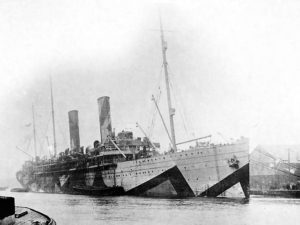
SS Kildonan Castle
(c) http://www.roll-of-honour.com/Ships/SSKildonanCastle.html
Find out about our connection with Dr Page and an introduction to his diary here
26th August 1919 Tuesday
The Highland Light Infantry and a Dance
All material produced or reproduced here and throughout this work is the sole copyright of the author and the family of Doctor D.C.M. Page MC
“On August 26th a transport arrived with the 2nd Battalion H.L.I. on board. It was good to see the ‘Jocks’ again. I knew they would be needed out here sooner or later. At night we held a grand dance in the Hospital. One of the big wards was utilised as a ball-room, and we had it beautifully decorated with flags and evergreens. Some of the side wards were used as refreshment rooms, and sitting out rooms. A huge crowd turned up including the D.D.M.S., A.D.M.S. and other officers. The Russian Naval Band supplied the music, which was excellent. The evening was a huge success. We finished at midnight with ‘Auld Lang Syne’.”
The Highland Light Infantry were a fearsome fighting unit emanating from Glasgow, Scotland. After being involved throughout World War 1, fighting in famous operations such as Neuve Chapelle in 1915 and the 2nd Battle of Ypres, the HLI had acquired a deserved reputation for being a regiment with high achievement. They had been retained in Germany until April 1919, after which they returned home to Glasgow. In the middle of August their presence was required to help finish the job in Archangel with things being cleared up and they remained there until the end of the year, enabling the regiment to add Archangel 1919 to the regiment’s battle honours.
![BuzzWeiser196 [CC BY-SA 4.0 (https://creativecommons.org/licenses/by-sa/4.0)]](http://whiz-bangskrumpsandcoalboxes.co.uk/wp-content/uploads/2019/08/Cap_Badge_HLI-283x300.jpg)
HLI Cap badge BuzzWeiser196 [CC BY-SA 4.0 (https://creativecommons.org/licenses/by-sa/4.0)]
